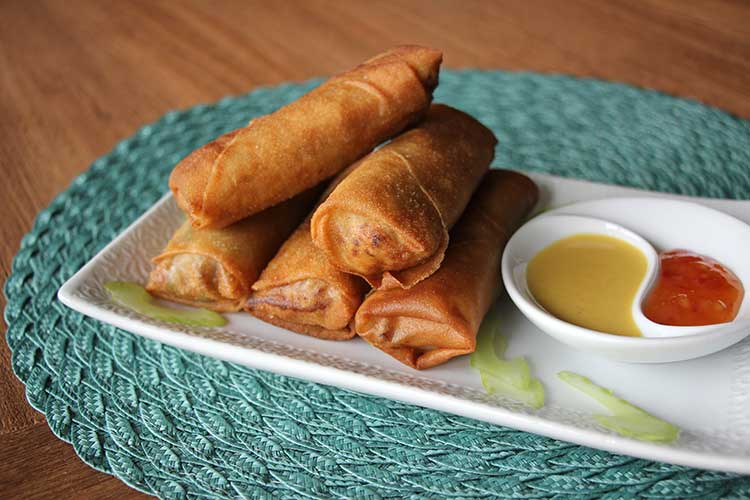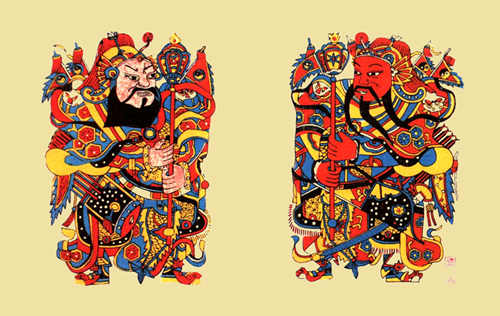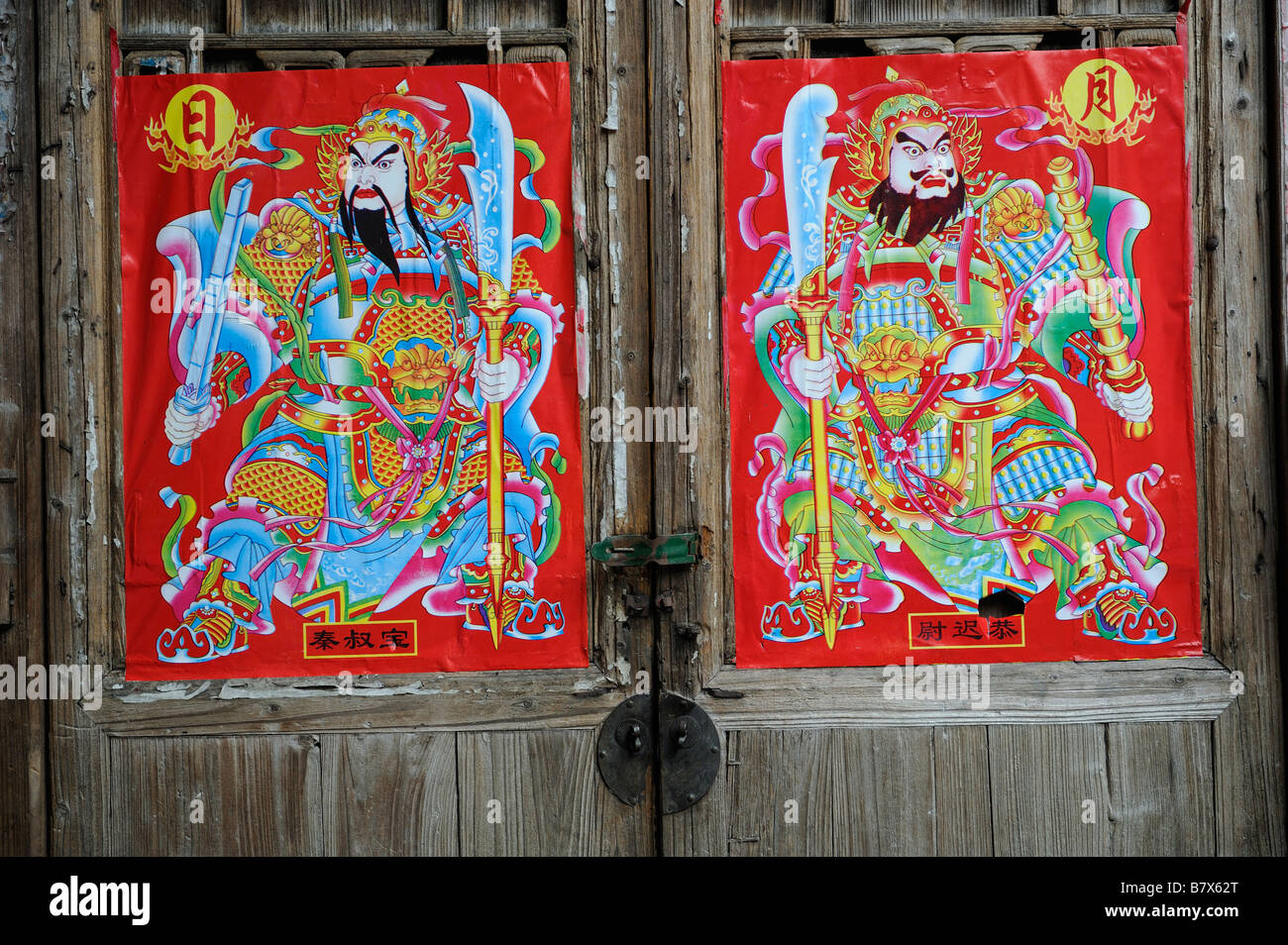Gallery
Photos from events, contest for the best costume, videos from master classes.
 |  |
 |  |
 |  |
 |  |
 |  |
 |  |
Families by tradition welcome back the Kitchen God from Heaven on the 4th day of Chinese New Year by hanging a new paper effigy above the hearth, a practice which has suffered neglect in the age of modern gas and electric stoves. The Door Gods. 门神 MénShén In modern use, door gods are usually printed images which are pasted to paired doors. They are usually replaced every Chinese New Year. [1] Occasionally, they are sculpted in relief or placed as statues to either side of a door. The figures should face each other; it is considered bad luck to place them back to back. [citation needed] Home Earth Continents Asia Thailand / China Chinese New Year Photos Chinese Customs and Traditions Glossary Door Gods ___ Door Gods The door gods (Chinese: 門神 - pinyin: mén shén) are worshipped by the Chinese as spiritual guardians of the entrance. Door gods are supposed to keep evil spirits from entering. During the Qing dynasty (1636-1911), they were depicted as door gods in Lunar New Year paintings from Wei County in the eastern Shandong province. However, rather than being pasted on front doors, their images were put on the gates where livestock and poultry were kept, which is why they are also called “gate paintings.” Worshipping Door Gods is an important custom among the Chinese during Spring Festival, the Lunar New Year. Door gods are pictures of deities posted on the door outside and inside the house. They are expected to keep ghosts away, to protect the family and to bring peace and good fortune. Dec 15, 2024 #Chinese myth, #Men Shen Preface: The Men Shen is a deity that guards the door in Chinese folk beliefs. It is a popular guardian deity in Chinese Han folklore, and is affixed to the door during the Chinese Lunar New Year to ward off evil spirits, protect the family home, ensure peace and prosperity, and bring good luck. During the Lunar New Year, in addition to pasting blessing characters and writing Spring Festival couplets, many families will also post "Door Gods (Menshen)" on the door. Although with the development of the times, fewer and fewer people follow the Door Gods, the Door Gods represent a shining point of Chinese culture and protect people's peace An alternative style involves civilian door guards wielding wooden staves, strategically placed on doors to ward off spirits, particularly during the auspicious occasion of New Year's Eve. Legends of the Door Guards. According to a legend, the white-faced door god is identified as Qin, while the black-faced counterpart is known as Yuo. 灶神 (zàoshén) (the Kitchen God) is the most important Chinese domestic god who takes charge of people’s diet, grants conveniences in life, and also examines the good or evil of the family. It is believed that on the 23 rd day of the twelfth lunar month, just before the Chinese New Year, the Kitchen God returns to Heaven to report the A typical Chinese house has a huge front gate/door with two wings that open in the middle. The door gods always come in pairs facing each other. It is considered bad luck to place the figures back-to-back. The image of a chubby baby is considered as a wing room door god, symbolizing good luck, longevity and fertility. Therefore, people do the same way to paint the images of General Chin and General YuChih on their door as the god of door. They think the god of door can protect then from ghost or bad spirit to entering their house. Today, It's hard to find the image of god of door in the modern house. But we still can see the god of door in the temples Kumquat trees are a very popular plant displayed during the Chinese New Year holidays, especially in South China's Cantonese-speaking regions of Hong Kong, Macau, Guangdong, and Guangxi. 7. Blooming Flowers — Wishes for a Prosperous New Year. Chinese New Year, also called Spring Festival, marks the beginning of spring. "Door Gods for Chinese New Year", VisitBeijing.com.cn, 16 February 2018. Lou Qijing (娄启倞), Nianhua de gushi [年画的故事, The Story of New Year pictures] (Beijing: Zhongguo minzu wenhua chubanshe, 2020) Sheng Wenqiang, "Spirited Away: A Peek into the World of China’s Door Gods", Sixth Tone, 23 January 2023 Another traditional Chinese New Year decoration is the door god. These are paintings or calligraphy of legendary figures, often depicted with fierce expressions and holding weapons, who are believed to protect homes from evil spirits. Men Shen, in Chinese religion, the two door gods whose separate martial images are posted on respective halves of the double front door of private homes to guarantee protection from evil spirits (guei). One tradition reports that two Tang-dynasty generals stood guard at the imperial gates during a This is about a Chinese custom. See also Janus the Roman god of doors. A door god is a painting pasted on a door. These were used by the Chinese as good luck. Door gods can be seen on temples - places of religion - and other buildings. There is a belief that door gods stop evil spirits from going into the building. Door gods are often in pairs The 24th lunar day of 12th lunar month is the Farewell Day for the God of Stove. 2025 Chinese New Year Day is on Wednesday, January 29, 2025. Chinese New Year Day is a new moon day, which is the first lunar day. Download this Chinese New Year Door God, Chinese New Year, Customs, Tradition PNG Hd Transparent Image with high quality and best resolution with transparent background on Lovepik for free. You can use this Chinese New Year Door God, Chinese New Year, Customs, Tradition PNG Hd Transparent Image and clipart image 3000 × 2000 px in your designs. Chinese New Year traditions regarding greeting are not like kissing, embrace, and handshaking in western countries. In the past, the first thing for a Chinese New Year visit started with kowtowing to the elders. No matter how old you are, if there is someone older than you, you need to kneel down to show respect and grateful feeling to the elders. Across the world, Chinese communities tend to celebrate Chinese New Year on the first weekend after Western New Year’s Day, as people work on New Year’s Day. Traditionally, Chinese New Year celebrations last until mid-January in the Chinese calendar, but wherever in the world it’s celebrated, the festivities mirror the unique traditions
Articles and news, personal stories, interviews with experts.
Photos from events, contest for the best costume, videos from master classes.
 |  |
 |  |
 |  |
 |  |
 |  |
 |  |